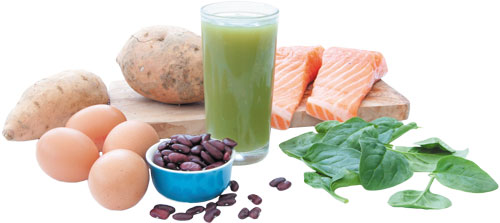5 Steps To Build And Maintain Digestive Health
When it comes to overall well-being, maintaining your digestive health is at least as important as keeping your cardiovascular health, bone health and the health of the rest of your physique. And the fantastic news is that for many people, it's an issue of taking simple preventative actions. Taking charge of your digestive health can help you improve your overall health, well-being, and pleasure. Thus, don't wait till you experience digestive problems. You can begin to make simple, proactive adjustments to your diet and lifestyle today that may benefit your digestive health now, and all throughout your lifetime.
Eat your fruits and veggies
Health and nutrition experts recommend eating 14 g of dietary fiber per 1,000 calories consumed. Fiber is found only in plant foods, such as fruits, vegetables, grains, legumes, nuts, and seeds. It is the part of the plant that isn't digested in the human body. It is important to consume foods containing both soluble fiber, such as oat bran and beans, and insoluble fiber, such as whole-wheat products. Both forms are necessary for a healthful diet.
In today's world, proteins have been obtained from two chief sources: animal foods (e.g. steak, chicken and fish) and plant foods (e.g. bean and soy resources ). Although animal sources of protein contain many essential vitamins and minerals, they also contain saturated fats and cholesterol. Plant proteins, such as legumes, soy products, and nuts, contain more beneficial mono- and polyunsaturated fats but no cholesterol. If you do select animal protein, choose lean meats, fish and poultry.
Vitamin A is a fat-soluble vitamin necessary for vision, growth, healthful skin and hair, tooth development, reproduction, and also the immune system. The most important form of vitamin A found in dried plums is beta-carotene, which functions as an antioxidant.
Vitamin D is a fat-soluble vitamin that is found in limited quantities in food such as salmon, mackerel, tuna, and fortified dairy products. Vitamin D can be produced by the human body following exposure to ultraviolet light (UV) rays from the sun. Vitamin D can help to maintain normal blood levels of phosphorus and calcium.
Calcium is the most abundant mineral found in the human body. It's responsible for building strong bones and teeth. It is also necessary for muscle contraction, blood vessel contraction and expansion, the secretion of hormones and enzymes, and for sending messages through the nervous system. Calcium is found primarily in dairy products, some vegetables, and fortified foods.
Potassium helps maintain normal blood pressure and is necessary for nerve impulses and muscle contractions. It's also significant in maintaining fluid and electrolyte balance through your body. Potassium was linked to reducing hypertension and the risk of stroke. A serving of dried plums (5 dried plums) provides 8% of the recommended Daily Value (3500mg daily) for potassium.
Iron is a vital nutrient for red blood cells, which transport oxygen to cells throughout the body. Iron deficiency anemia may grow if the body lacks the iron essential to make red blood cells. Iron is particularly important for women and children.
Folic Acid is a B vitamin that can lower the risk for neural tube defects. Additionally, it protects against heart disease and stroke through its own function in the metabolism of this amino acid, homocysteine. Elevated levels of homocysteine are thought to contribute to cardiovascular disease and cognitive decline in the elderly.
Instead, highlight complex carbohydrates, such as whole grains, since they're higher in fiber and contain lots of the vital nutrients necessary for optimum digestive health.
Studies indicate that a low-fiber, high-fat diet may increase the risk for some types of obesity, cancer, adult-onset di, bytes and cardiovascular disease. Health and nutrition experts recommend choosing a diet that offers no more than 30 percent of calories from fat, and that the majority of the fats be polyunsaturated and monounsaturated fatty acids.
These are the following steps to build and maintain digestive health. If you're looking for nutritional supplements to maintain your overall health check out nightly essence.
For further more information you can visit young90health.
1. Eat Your Fruits and Veggies
Include a broad spectrum of colorful fruits and vegetables, including dried fruits in your daily diet. They are packed with important vitamins, minerals and other nutrients that supply a wide array of health benefits such as enhancing your digestive health.Eat your fruits and veggies
- Fruits and vegetables contain fiber plus a broad range of nutrients important for maintaining digestive health. Read more about the benefits of fiber below.
- Eating fruits and vegetables as part of an overall healthy diet can also help lower your risk for chronic diseases such as cardiovascular disease and some cancers.
2. Get Plenty of Fiber
Fiber can assist your GI tract to stay"regular," improve cardiovascular health and regulate blood sugar levels. Fiber also reduces cholesterol levels in blood circulation, enhances proper bowel function, prevents constipation and diverticulosis, and provides a sense of fullness without adding calories. It is found in plant sources, so be sure to eat a diet containing a wide variety of fruit, vegetables, legumes, and whole grains.Health and nutrition experts recommend eating 14 g of dietary fiber per 1,000 calories consumed. Fiber is found only in plant foods, such as fruits, vegetables, grains, legumes, nuts, and seeds. It is the part of the plant that isn't digested in the human body. It is important to consume foods containing both soluble fiber, such as oat bran and beans, and insoluble fiber, such as whole-wheat products. Both forms are necessary for a healthful diet.
- Soluble fiber mixes with water to create a gel-like consistency; this slows digestion to help the body absorb more nutrients and eliminate substances such as cholesterol. Soluble fiber can play a protective role in cardiovascular disease and diabetes. Research indicates that eating foods with soluble fiber can help restrain blood glucose levels of cholesterol and glucose. Oats and oat bran, nuts, legumes, peas, and some fruits and veggies such as dried plums, carrots and apples all provide soluble fiber.
- Insoluble fiber helps prevent states of the gastrointestinal tract such as constipation, diverticulosis (a condition affecting 10% of people over the age of 40 where sections of the colon protrude through weak areas forming what look like pouches) and migraines. Insoluble fiber may play a role in preventing some types of cancer. Whole grains (especially wheat bran), skins of fruits, dried plums and lots of veggies (cauliflower and potatoes) provide fiber.
3. Consume Adequate Protein
Consume adequate protein, particularly vegetable protein, as part of a healthy and balanced diet. Try non-animal foods such as legumes and soy products.In today's world, proteins have been obtained from two chief sources: animal foods (e.g. steak, chicken and fish) and plant foods (e.g. bean and soy resources ). Although animal sources of protein contain many essential vitamins and minerals, they also contain saturated fats and cholesterol. Plant proteins, such as legumes, soy products, and nuts, contain more beneficial mono- and polyunsaturated fats but no cholesterol. If you do select animal protein, choose lean meats, fish and poultry.
4. Get Your Nutrients from Food First
The nutrients obtained from meals play an essential part in the health of the entire body, including digestive health. The human body requires a wide spectrum of nutrients in order to function optimally throughout your life. Getting the ideal nutrients is more than feeling great in the current day, it's about a lifetime of health and wellness.Vitamin A is a fat-soluble vitamin necessary for vision, growth, healthful skin and hair, tooth development, reproduction, and also the immune system. The most important form of vitamin A found in dried plums is beta-carotene, which functions as an antioxidant.
Vitamin D is a fat-soluble vitamin that is found in limited quantities in food such as salmon, mackerel, tuna, and fortified dairy products. Vitamin D can be produced by the human body following exposure to ultraviolet light (UV) rays from the sun. Vitamin D can help to maintain normal blood levels of phosphorus and calcium.
Calcium is the most abundant mineral found in the human body. It's responsible for building strong bones and teeth. It is also necessary for muscle contraction, blood vessel contraction and expansion, the secretion of hormones and enzymes, and for sending messages through the nervous system. Calcium is found primarily in dairy products, some vegetables, and fortified foods.
Potassium helps maintain normal blood pressure and is necessary for nerve impulses and muscle contractions. It's also significant in maintaining fluid and electrolyte balance through your body. Potassium was linked to reducing hypertension and the risk of stroke. A serving of dried plums (5 dried plums) provides 8% of the recommended Daily Value (3500mg daily) for potassium.
Iron is a vital nutrient for red blood cells, which transport oxygen to cells throughout the body. Iron deficiency anemia may grow if the body lacks the iron essential to make red blood cells. Iron is particularly important for women and children.
Folic Acid is a B vitamin that can lower the risk for neural tube defects. Additionally, it protects against heart disease and stroke through its own function in the metabolism of this amino acid, homocysteine. Elevated levels of homocysteine are thought to contribute to cardiovascular disease and cognitive decline in the elderly.
5. Limit Fats and Concentrated Sweets
Instead, highlight complex carbohydrates, such as whole grains, since they're higher in fiber and contain lots of the vital nutrients necessary for optimum digestive health.
Studies indicate that a low-fiber, high-fat diet may increase the risk for some types of obesity, cancer, adult-onset di, bytes and cardiovascular disease. Health and nutrition experts recommend choosing a diet that offers no more than 30 percent of calories from fat, and that the majority of the fats be polyunsaturated and monounsaturated fatty acids.
These are the following steps to build and maintain digestive health. If you're looking for nutritional supplements to maintain your overall health check out nightly essence.
For further more information you can visit young90health.










Comments
Post a Comment